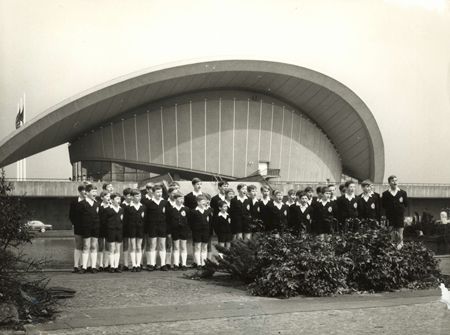1970: The Berlin Film Festival faces a crisis
The discussion on Verhoeven, Vietnam and “anti-Americanism”

At the beginning of the year, Cornelia Froboess and the Schöneberg Boy’s Choir, famous for songs like “Berlin bleibt doch Berlin” (Berlin will always be Berlin) and “Das ist die Berliner Luft, Luft, Luft” (This is Berlin’s air, air, air) create “Music and a good atmosphere” in front of the Congress Hall. That, at least, is what the announcement promoting the televised concert broadcast promises. In March, the Four Powers Talks on Berlin commence. Irreconcilable questions of principle are excluded from the start. The participants agree on some practical measures. East Germany is recognised de facto by the West; in return, the USSR accepts West Berlin’s integration into the Federal Republic of Germany. Detente catches on.
This year’s Berlin Film Festival, which opens at the Congress Hall on 29 June, is neither as cheerful nor as relaxed as in the past. The Belgian film “Klann – Grand Guignol” is in the competition. The applause is weak, the film's stars don’t show up, but the police do. The film, in the words of the Berlin daily the Tagesspiegel, was "discreetly but forcibly confiscated.” Things go from bad to worse, however: a sign of troubled times. In Vietnam, the Americans continue their advance, and their involvement there becomes the subject of great controversy among both Germans and Americans. Only a few days after the Berlin Film Festival opens, the war in Vietnam triggers the deepest crisis in the history of the event. Competition is brought to an abrupt halt following some rather dramatic events. The Berlin Festival director, Walther Schmieding, tenders his resignation and calls on the jury of this, the twentieth, festival to do the same. However, the jury members refuse to follow his example. The conflict is exacerbated by a rumour that the jury has excluded Michael Verhoeven’s film “o.k.” from the competition. It is rumoured that the majority of jury members have reached the conclusion that this feature film violates the rules of the Berlin festival because it deals with the sexual excesses of American soldiers in Vietnam. (The rules state that films must encourage understanding between nations.) According to Michael Verhoeven and his producer, Rob Houwer, Jury President George Stevens – an American … – has threatened to resign if “o.k.” is not withdrawn. The situation is aggravated by the fact that the Festival Selection Committee admits “o.k.” but reject a documentary film on the invasion of Czechoslovakia by the Soviet Union. Is this a sign of “anti-Americanism”? Heated discussions take place at the Europa Center, the press meeting-place. Certainly, thus the film is doing precious little to promote understanding between the nations of America and West Germany! For some time now, the American population has been divided over the Vietnam War. In the wake of these incidents the jury resigns and Verhoeven withdraws his film. Others follow his example and withdraw their contributions too. Consequently, no Bears are awarded this year. At the end of the Festival, the foreign guests are unceremoniously sent home when the final gala is also cancelled. The CDU deputy and hotel owner Heinz Zellermeyer subsequently lodges a protest in the Berlin Abgeordnetenhaus (Chamber of Deputies) over this display of bad manners and lack of hospitality.
Dina Koschorreck
Tagesspiegel 26 June 70, 27 June 70, 28 June 70, 4 July 70, 5 July 70, 8 July 70
Berlinale Yearbook 1970